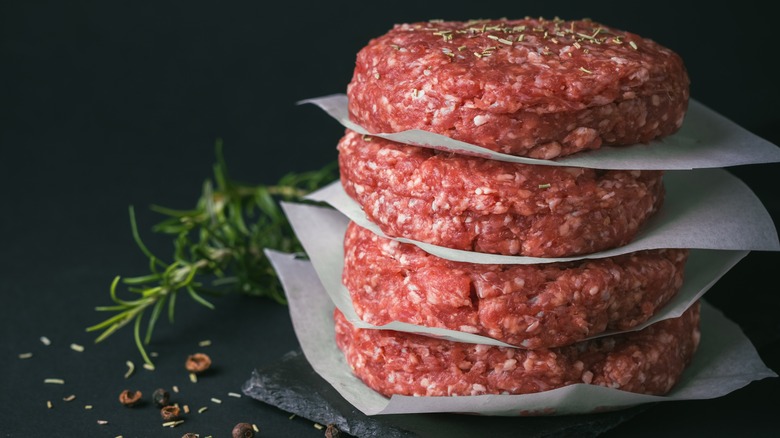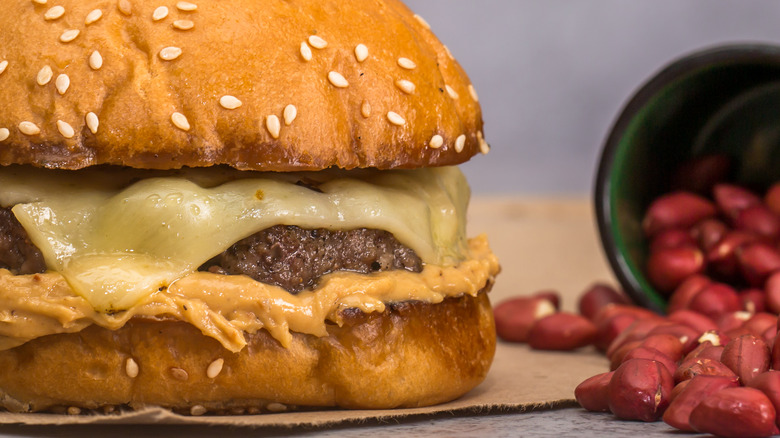Peanut Butter Has All The Nutritional Benefits Of This Popular Animal Protein
If we were to compare a slab of meat to a sandwich spread and ask you which had more nutritional value, it might look like there's no competition. To test this theory, let's take a closer look by breaking down the nutritional profile of one of America's most beloved sandwich fillings: peanut butter. With approximately 94% of U.S. households harboring one or more jars of peanut butter (via National Peanut Board), let's see how it stands up next to one particularly popular animal protein. If you're a fan of cheeseburgers, you know it well: beef.
The U.S. Department of Agriculture (USDA) reports that in a 100-gram serving of cooked ground beef, you have 25.54 grams of protein, 302 milligrams of potassium, 192 milligrams of phosphorus, 24 milligrams of calcium, 20 milligrams of magnesium, and 6.2 milligrams of zinc — just to name a few of its many top-notch nutrients. In comparison, the same-size serving of peanut butter is made up of 22.5 grams of protein, 564 milligrams of potassium, 339 milligrams of phosphorus, 49 milligrams of calcium, 169 milligrams of magnesium, and 2.54 milligrams of zinc (via USDA). When looking at protein content, there's not much difference between the two. While ground beef may come out on top in terms of zinc content, peanut butter takes home the trophy when it comes to potassium, phosphorus, calcium, and magnesium.
How peanut butter stacks up against ground beef and sirloin steak
As we've learned, not only does peanut butter measure up to ground beef with many of the same nutrients, but in some categories, peanut butter far surpasses it. But is this still the case when we look at other forms of beef? For example, in a 100-gram serving of sirloin steak, you'll find 30.8 grams of protein compared to peanut butter's 22.5 grams (via USDA). While not a monumental difference, sirloin steak comes out ahead of both peanut butter and ground beef for protein content. You'll also get 410 milligrams of potassium, 253 milligrams of phosphorus, 22 milligrams of calcium, 27 milligrams of magnesium, and 5.7 milligrams of zinc. Much like peanut butter, this shows that sirloin steak is rich in potassium, phosphorus, and zinc. That being said, peanut butter gives us more than double the calcium content and more than six times the magnesium content of sirloin steak.
Between the two, if beef is your personal preference, experts suggest that it's best consumed in moderation. According to 2017 research published in the Journal of Internal Medicine, a link was found between high consumption of red meat (particularly processed meats) and greater susceptibility to certain chronic diseases, such as diabetes, heart failure, and coronary heart disease, amongst others.
Both peanut butter and beef are best consumed mindfully
Just as eating large amounts of red meat may come with potential health hazards, excess consumption of some commercially available peanut butters can, too. Much like processed meats, some peanut butter products are made with added ingredients like sugar, trans fat, and oils, making these brands less healthy than natural peanut butters. For this reason, some people opt to DIY their own peanut butter. Others may instead shop for natural options, such as those free of added ingredients with the exception of a minimal amount of salt.
If you're interested in swapping out beef for a more heart-healthy animal protein, chicken certainly gets the job done. Although a 100-gram serving of cooked, boneless, skinless chicken meat has over 9 grams more protein than the same-size serving of peanut butter (via USDA), both foods are still rich sources of many of the same nutrients. In fact, peanut butter still takes the cake when it comes to potassium, phosphorus, calcium, magnesium, and zinc.



